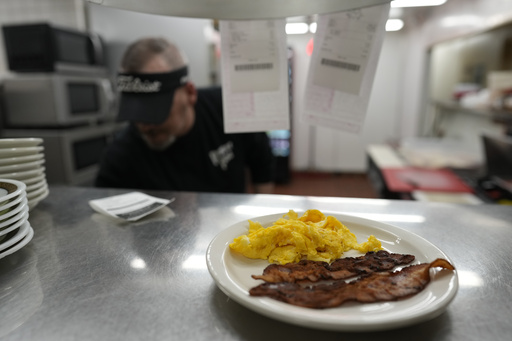
It’s a perplexing situation for restaurants across the U.S. as they face escalating egg prices, while simultaneously, their breakfast offerings might be exacerbating the issue.
The breakfast sector is experiencing a surge, with more diners flocking to eateries for morning meals. Restaurant chain First Watch has seen an impressive growth in its locations, nearly reaching 570 in the past decade. Similarly, Eggs Up Grill has expanded from 26 to 90 outlets in nine southern states since 2018, and Another Broken Egg Café in Florida celebrated the opening of its 100th restaurant last year.
Fast-food establishments are also enhancing their breakfast menus. Starbucks, which introduced egg bites in 2017, now features a breakfast selection that includes 12 egg-based items. Wendy’s, after reintroducing breakfast in 2020, offers 10 different egg-inclusive options.
According to data from Yelp, the U.S. saw a rise of 6,421 breakfast and brunch businesses last year, marking a 23% increase compared to 2019.
During typical times, producers would manage to meet this rising demand for eggs. However, an ongoing bird flu outbreak, which has led to the culling of approximately 159 million birds—almost 47 million since early December—has severely restricted supply and inflated prices. In January, the average price for a dozen eggs in the U.S. reached an unprecedented $4.95.
Although exact statistics on the percentage of eggs utilized by U.S. restaurants compared to grocery stores or manufacturers are not publicly available, it is reasonable to deduce that restaurant demand is on the rise. Market research firm Circana noted that foot traffic for breakfast meals has increased more than any other dining segment since 2019, with morning visits accounting for 21% of overall restaurant visits in 2024.
Breakfast sandwiches topped the list of popular orders during morning hours according to Circana, with a significant 70% of breakfast sandwiches across U.S. menus containing eggs. Ricky Richardson, CEO of Eggs Up Grill, stated that breakfast restaurants gained popularity post-COVID due to a consumer desire for comfort and social connections. As inflation nudges food prices higher, diners regard breakfast and lunch as more budget-friendly dining options.
The current demand for eggs marks a significant shift from a trend during the pandemic when many consumers opted to hoard eggs for home cooking while restaurants reduced their orders due to temporary shutdowns, according to Brian Earnest, an economist focused on animal proteins at CoBank.
Changing consumer preferences have further strained the market. There is a growing inclination among Americans for proteins with fewer additives, which gives eggs a competitive edge. “When making a dish with eggs, consumers associate that with freshness,” Earnest explained.
In response to animal rights advocacy, companies like McDonald’s have transitioned to using entirely cage-free eggs, narrowing their purchasing options. Additionally, ten states, including California and Colorado, have enacted laws mandating that only cage-free egg products can be sold. “This makes the market more complex than it was two decades ago,” remarked Earnest.
The surge in egg prices is proving troublesome for restaurants. According to the U.S. Department of Agriculture, wholesale egg prices recently reached a national average of $7.34 per dozen, a shocking 51% increase since the start of the year. Some restaurant chains, including Waffle House, have begun imposing surcharges to help balance the rising costs of eggs. Others are contemplating the use of egg alternatives, like tapioca starch, in their recipes or even eliminating some egg-centric dishes from their menus, highlighted Phil Kafarakis, president and CEO of the International Foodservice Manufacturers Association.
Chris Tomasso, President and CEO of First Watch, emphasized the critical role eggs play in the chain’s menu, appearing in the majority of its offerings—either as a main dish or an ingredient. Thus far, he noted that the restaurant has managed to acquire necessary eggs without passing on additional charges to customers.
To address the rising costs, First Watch is also increasing portion sizes for non-egg menu items like meat and potatoes, Tomasso added. Meanwhile, Richardson of Eggs Up Grill mentioned that he convened with franchisees to discuss potential surcharges related to egg prices, but they ultimately decided against implementing any increases. “Eggs have always been and will always be integral to the American diet,” Richardson concluded.

